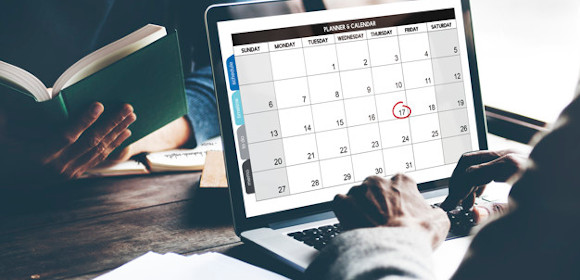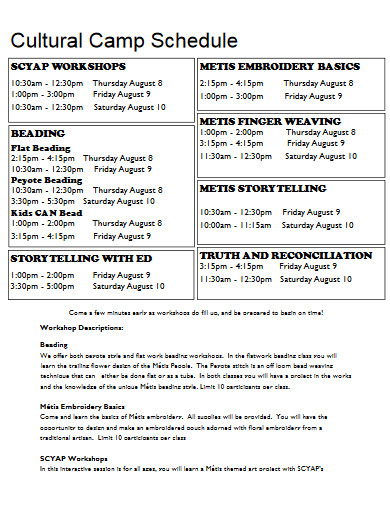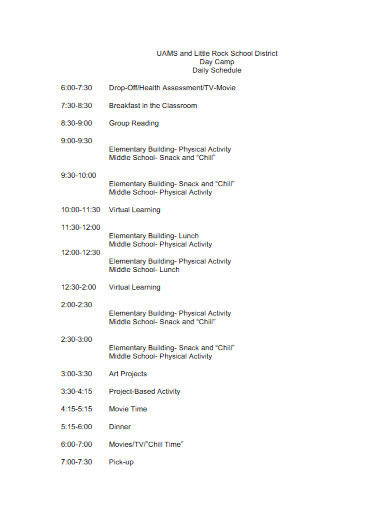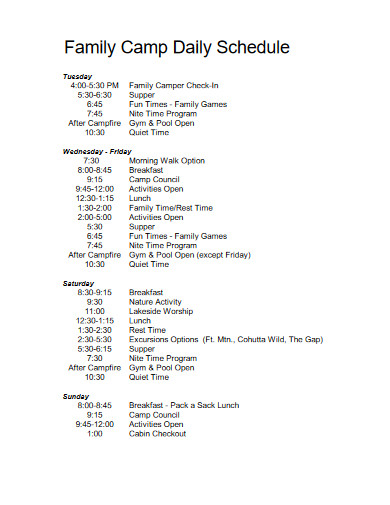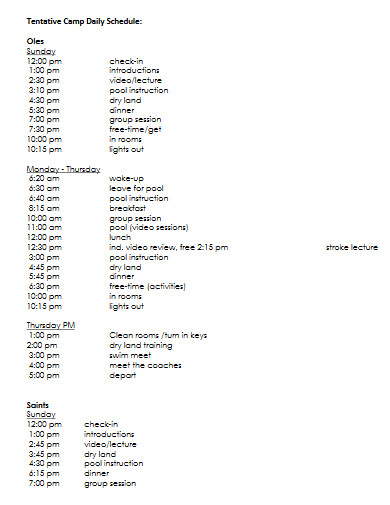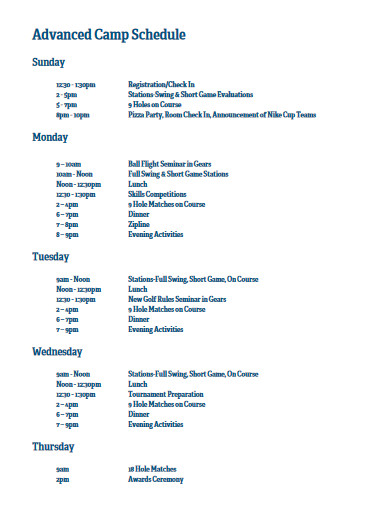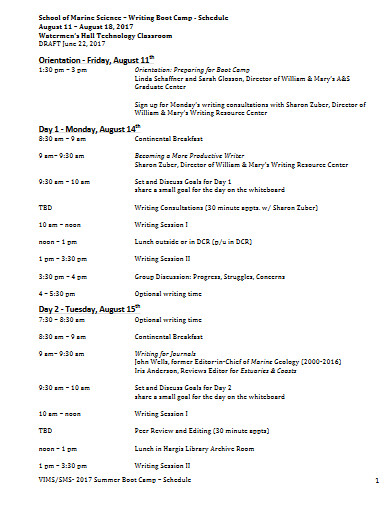10+ Camp Schedule Examples to Download
The adventure starts when you decide to take that mighty step outside your comfort zone. Camping, especially for those who are foreign to the experience, can be daunting and too much. There’s too much to bring with a promise of little comfort in the middle of nowhere where the risks include hungry wolf and an enraged lion. However, it could turn out to be a memorable time with the right plan or the right program. Have a reliable camp schedule to help you manage your camp activities and have the experience of a lifetime. Whether you’re bringing your family and friends or organizing a camp fore several participants, a camp schedule will be your ultimate companion.
10+ Camp Schedule Examples
1. Camp Schedule Template
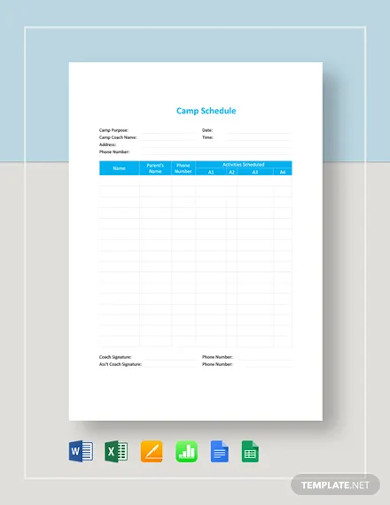
2. Summer Camp Daily Schedule Template
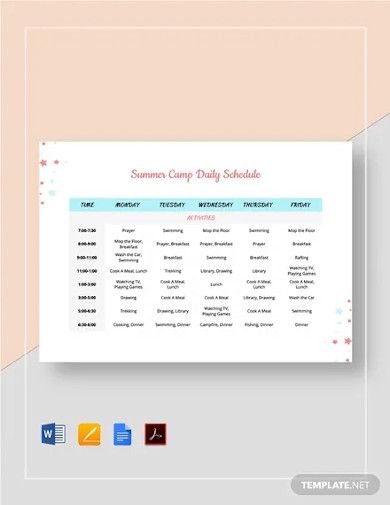
3. Free Weekly Camp Schedule Template
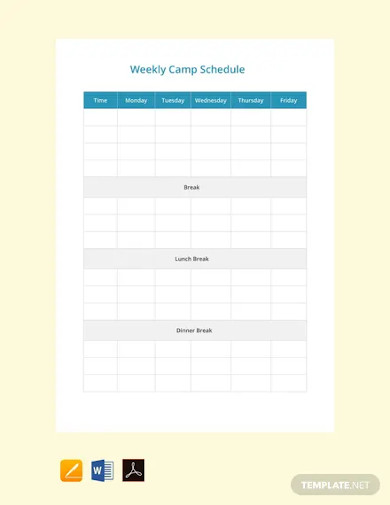
4. Free Summer Camp Schedule Template
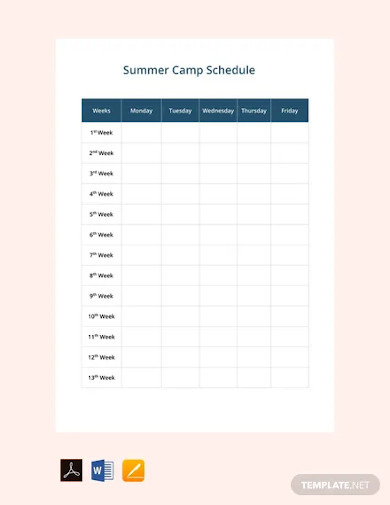
5. Free Camp Daily Schedule Template
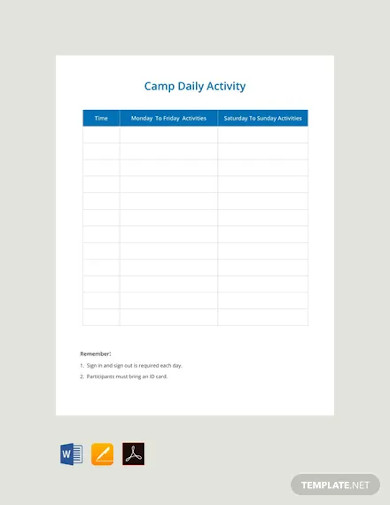
6. Cultural Camp Schedule
7. Day Camp Daily Schedule Example
8. Family Camp Daily Schedule
9. Tentative Camp Daily Schedule
10. Advanced Camp Schedule
11. Boot Camp Schedule Template
What Is a Camp Schedule?
A camp schedule contains the event’s list of agenda and activities on a specific duration. It’s a plan with emphasis on the time and date on when it happens. This is an essential tool in organizing a camp’s activities because it allows the event’s manager to see the bigger picture and ensure that every part of the day of the event schedule has a designated activity that the participants can enjoy.
Benefits of Going on a Camp
In 2018, there were approximately 41.67 million campers ages six and beyond in the US. Since 2006, the number of American campers has never gone down below 40 million annually. Its steady popularity makes it a typical recreational for any household in the country.
So, why camp? Whether you’re going on an organized camping facility or you’re backpacking all by yourself up to the mountains, preparing for it can be a hassle. Plus, it might rip off a huge amount of time from your hectic work schedule. However, camping has proven to offer several surprising mental, physical, emotional, and social benefits to boost your overall health. Here are some of them:
1. Releases stress. Because you’re away from your life’s major stressors, such as obsessive screen time, work tasks, and household complications, you’ll be able to relax and de-stress.
2. Improves your sleep quality. If you’re not used to camping outdoor, sleeping on hard ground can be a challenge. However, because you’re far from distraction, you’ll be able to sleep well and reset your circadian rhythm.
3. Enhances your mood. Leaving the suffocating confines of the city and reconnecting with nature can help you swat negative thoughts away and put you in your best mood.
4. Improves physical fitness through motor activities. Camping often demands you to do physical activities, prompting you to exercise. This can be a great addition to your fitness plan.
5. Provides an opportunity to explore and travel. Besides being able to escape your stressful routine, you’ll get acquainted with new places and majestic scenery that you’ll surely love.
6. Develops practical skills. Because you’ll have limited baggage and limited resources, you’ll be able to think of ways on how to make it work with what you have, thus improving your practicality.
How to Prepare a Camp Schedule
Here are some guidelines that will help you prepare a camp schedule:
1. Determine All Activities
Before you can start organizing what the camp schedule will be for the entire camp duration, have a complete list of activities first. This way, you’ll be able to generate the schedule by plotting them down on a time-frame. Brainstorm ideas of what your camp program should have. There’s a lot that you can do, and it could be hard to choose what goes to your project list and what should not be. For a tip, have a camp theme where you can base your activities on. If you want to organize a sports camp, it goes without saying that you’ll have days full of physical activities. If you want to have a children’s leadership camp, your activities should lean towards teaching kids how to be dependable and trustworthy.
2. Determine the Timeline
Once you have the activities, decide on your timeline. How long is your camp going to be? Weeks? Days? Over a month? This helps you break categorize the different activities and assign them to different slots of your schedule. As an example, if you’re joining a five-day outdoor summer camp, you can prepare a daily schedule that would cover that entire duration. If you’re preparing for a seven-week youth training camp, divide it into a weekly schedule so you can comfortably prepare for each week instead of cramming it all in a lengthy camp calendar.
3. Create a Flow
The beauty of camp activities lies in how they connect all together. It would be confusing to do random camp activities throughout a month without a purpose. It wouldn’t also be right to have a theme, such as a summer camp, and not do anything that’s related to the season. Assess your activities and identify how you can arrange them on the timeline so that they connect together. As an example, if you’re doing an animal kingdom theme for a preschool day camp, you can do a jungle adventure that features the different forest creatures to stimulate the children’s imaginations.
4. Schedule the Breaks
You can’t pack the entire camp duration with nonstop activities, games, and sessions. Your participants would grow listless and, eventually, become uninterested in participating in any camp agenda. Examine your activity schedule and identify which specific time of the day you can squeeze in a break period. You can also adjust their break according to the weight of the activity. For example, if they perform challenging physical activities during the afternoon, they can have the next period off until the activity later that night.
5. Have a Back-Up Plan
It’s customary to organize a back-up camp plan for your schedule in case an unforeseen interference occurs. This could include weather disturbances, power outages, or appliance defects. Create an option B for activities that are at risk of cancellation or interruptions. Finalize your activities and organize them in an outline with its corresponding schedule so you can assign them easily.
FAQs
According to The Washington Post, the average age for a child to join an overnight camp is between seven to nine years old.What’s the youngest age for a child to participate in a camp?
Because there’s little chance of rain, many people consider summertime as the best season for camping. However, Reserve America also suggests spring as the best time for camping because the weather is cooler than summer’s humid atmosphere. There are also fewer crowds and lots of activities.When is the best season to go camping?
This depends on the duration of your trip and the activities you plan to do. However, according to Reserve America’s budget breakdown, the cheapest camping trip costs approximately $180, and the most expensive is around $1,700.What is the average cost of going on a camping trip?
Camping trips are a fun way to break your life’s draining monotonous cycle and enjoy nature’s beauty with several fun activities. Getting holed up in your daily routine for the longest time can cause a build-up of stress and fatigue that may cause harmful effects on your mental and emotional state. Pause and recharge by going on an outdoor camping trip. This helps you get back in shape and face your work life with more vigor and an elevated enthusiasm. Have a camp schedule template to help you manage your travel itinerary efficiently. Download now!


